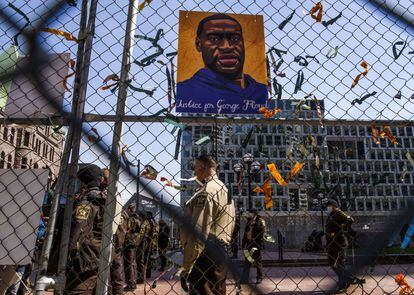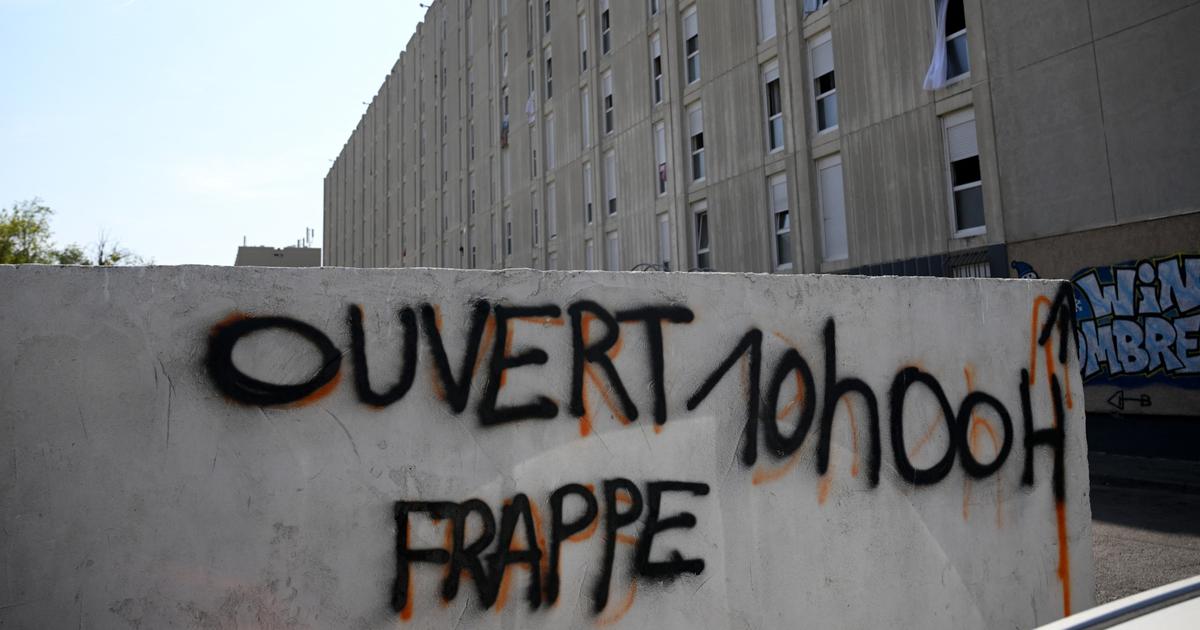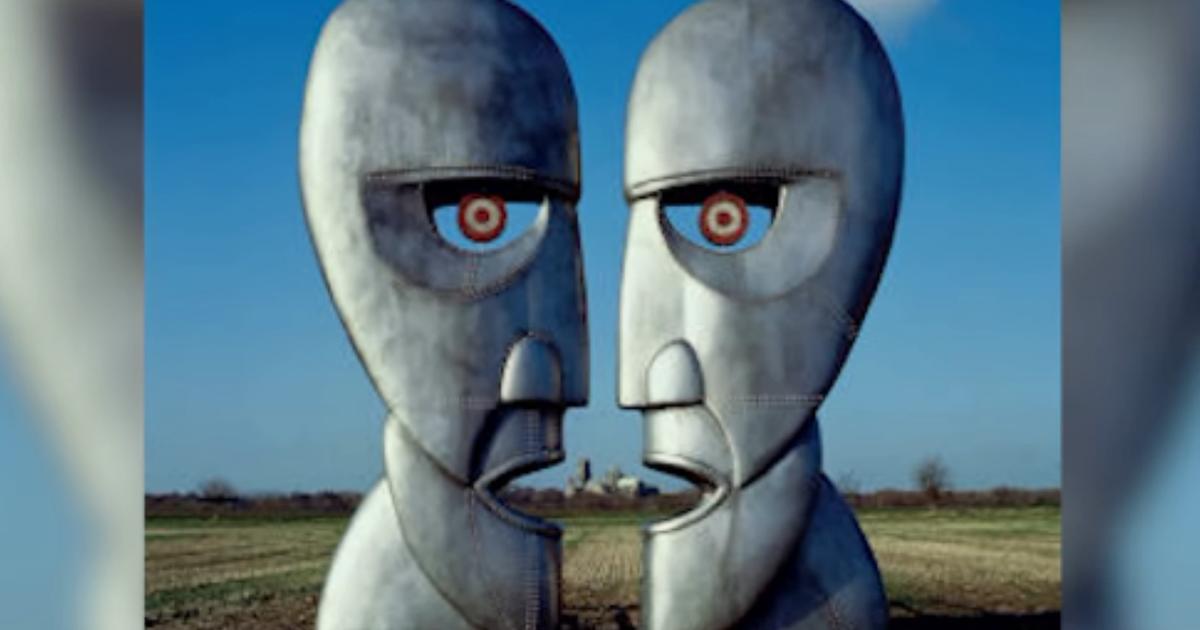The phones at the Cup Foods store in Minneapolis, Minnesota, do not stop ringing on Wednesday morning.
Acquaintances of Mahmoud Abumayyaleh, the owner, call anxiously to find out if he is following the trial against former police officer Derek Chauvin, 45, accused of killing African-American George Floyd in May 2020 by pressing his knee against his neck for nine minutes.
The cashier at this supermarket notified 911 that Floyd had tried to pay with a counterfeit $ 20 bill, which triggered the police arrest.
Abumayyaleh, his employees and a handful of customers stare at a television as that teller, Christopher Martin, 19, testifies in tears that he feels guilty about making the call: ticket, this could have been avoided ”.
The first week of the hearing for the brutal death of the African American has reopened the racial wound in the United States and in Minneapolis itself, which tries to digest the difficult legacy of the Floyd case.
The trauma that emerges in the testimonies of a dozen witnesses who believe that they should have done more to prevent what happened is an example of how it has marked the city.
Days ago, before the rain washed it away, on the sidewalk outside the store it was written in chalk: "Don't shop at Cup Foods, they helped assassinate George Floyd."
Abumayyaleh, like the millions of viewers who follow the historic trial on television, is now seeing the footage of Floyd inside his venue that fateful May 25 for the first time.
He was not in the trade and investigators seized the images after the event.
"It's weird," he escapes.
The Minnesota Office of Criminal Detention asked him not to make public comments until the trial is over, but the testimony of the cashier, who left his job after the event and needed psychological help, causes him to break the discretion agreement to clarify details that do not leave in bad place to your business.
When asked if the protocol establishes calling the police when they detect a counterfeit bill, Abumayyaleh is silent again.
The witness cited just before teller Martin had nothing to do with the call, but she is also haunted by remorse;
He believes that the course of what happened could have changed.
Genevieve Hansen, a firefighter and emergency medical technician, passed by the corner of 38th Street and Chicago, where the event occurred, now a memorial dubbed George Floyd Square.
He desperately offered his help for the African American as he cried out on the ground that he could not breathe, but the agents would not allow him.
"There was a man who was being killed," Hansen said through tears.
She explained that she could have given Floyd medical attention, but that the detainee "was denied that right."
After leaving the court, Hansen tells this newspaper that having testified has allowed him to close the bitter chapter.
“Last May 25th changed my life, but now I feel like I can move on,” he says at the gates of fire station number 1. He only regrets having “broken” while describing the frustration he felt.
Another witness who collapsed on the stand is Darnella Frazier, who recorded with her mobile the brutal video of the arrest that went around the world when she posted it on Facebook.
The 18-year-old recounted that there are nights when she apologizes to Floyd for not having done more.
But "it is not what I or the rest of the witnesses should have done," he said, "it is what he should have done," he added, referring to police officer Chauvin.
The demonstrations continued outside the Government Center during the Derek Chauvin trial.Stephen Maturen / AFP
Outside the courthouse, three successive concrete and barbed wire barriers surround the building.
There are military tanks and members of the National Guard deployed in case of disturbances.
There have been almost no demonstrations, but authorities and business owners braced for fear of a renewed violence that gripped the city last fall during protests against police abuse and racism.
It is another of the wounds that these days fester in Minneapolis, that of mistrust between communities.
The large deployment of security has provoked the anger of civil rights organizations, who see the measures as a continuation of the “criminalization” of the African-American community, in the words of Julia Johnson, spokesperson for Black Vision, an organization that fights for “ black liberation ”in Minnesota.
As witnesses trapped in trauma parade, African Americans hope the case will return to them a judicial system that many consider arbitrary and discriminatory.
The police who are accused and come to sit on the bench for killing a suspect are the fewest.
And those who pay with jail, anecdotal.
The police themselves are divided on Chauvin's action.
Several veteran officers have said at trial that the use of force with Floyd was excessive and unnecessary.
Others, like agent John D. Hawes, 50, gives the defense thesis a chance, which clings to the fact that there was a trace of drugs such as fentanyl or methamphetamine in Floyd's blood.
"I'm very interested in seeing what they determine was the cause of death, if they can show that a knee to a guy's neck can kill him," says the policeman in an armored pharmacy in the city center.
Since Floyd's death there has been an increase in police departures in Minneapolis.
For months, the streets demanded that the security department be dismantled and the City Council promised to do so, although in the end it only cut the budget.
The loss of prestige and a feeling of abandonment by the authorities has led to an increase in casualties, while crime has soared to levels not seen since the mid-1990s in the city.
"This has been absolutely horrible for us, we just want it to end and turn the page," says Agent Hawes of the Floyd case.
“We have lost almost 25% of our employees and I don't know if we will get them back.
It's unprecedented, "he adds.
Are the deaths of African Americans at the hands of the police also unprecedented?
After a long sigh, he replies, “No.
It depends on whether we are talking about the State (of Minnesota) or the country.
I don't know what the statistics are ”.
Each year, the police shoot about 1,000 people to death in the United States.
Whites die more than blacks, but as a percentage of the population, African Americans are twice as likely to be shot by an officer, according to a tally by
The Washington Post
.
"This is just a formality," alleges Malcom Samuels, 62, in front of the television broadcasting the trial at Cup Foods.
This Afro-American radio producer is not moved by the former's testimony and does not believe that the wounds in the city will heal.
“They [Chauvin] are going to be convicted, but they are going to continue without giving us loans, without selling us houses, or having our businesses.
This trial is not going to put an end to racism ”, he sentenced.






/cloudfront-eu-central-1.images.arcpublishing.com/prisa/LBC7PC5Y36CEPYY7PC5AGQYABA.jpg)


